Any questions about the history of the Olympics? Well, you have come to the right place. Here you can information on the Olympic and how they compare to the modern-day games; the history of the Olympics; and the Olympic Games Truce; and much more. Below in FAQ about the Olympic Games.
The Olympics
The Olympics have changed though the years since ancient Greece. Though competition and sport has existed in almost every civilization, the preparation and importance placed into the ancient games greatly affected the lives and culture of the people in Greece. Become an Olympic winning brought lots honor to that person and their families. Those ancient games developed as a product of men training for war and for preparation for battles, the body had to be properly readied. Some of the events include running, throwing the javelin for accuracy, throwing the disk for distance, jumping, and wrestling were all skills necessary for in battle. The games were held every four years, and today they still are. An Olympic competitor had to take an oath that he had trained for at least one year, just before competing. Ancient Greeks believed in many gods with a specific task attributed to each event in the Olympics. Women were not allowed to participate in or to view the games, but today they can. Men would participated in the nude, so the women who attempted to view the games could be punished severely. These games were to honor Zeus and to determine the most skilled athletes of each of the four years.
The phase, ?To the victor belongs the spoils,? began in Greece and was often associated with war. The winner of an ancient Olympic event received different awards than the ones given today. A few interesting awards are:
- An Olympic victor would receive a wreath placed upon the head.
- He paid no taxes during the year of his victory. Sometimes paid no taxes for life.
- He would received free route between enemy lines during a war.
- He would have a year named for him.
- The people of his birth place would receive free food and shelter for undetermined amount of time.
But there was no mention of a second or third place winner; only that victorious athlete received accolades.
History of the Olympics
According to a legend, the Olympics were founded by Hercules, the son of Zeus. But the first Olympics were held in 776 BCE and Coroebus won the only event the stade. He run about 192 meters. After that the Olympics games were held every four years for almost 1200 years. Then in 393 C.E., a Roman emperor Theodosius I abolished the Games because of their bad influences. After 1500 years later, a young Frenchmen named Pierre de Coubertin began their renewal. After lots of research, Coubertin decided that the Olympic games were just exercise that made a well-rounded and active person. He attempted to get the French interested in the sport but it was failed but he still keep trying. Then in 1890, Coubertin decided to form a sports organization called Union des Sociétés Francaises de Sports Athlétiques (USFSA). After two years later, Coubertin pitched his idea to revive the Olympic Games again. At a meeting of USFSA in Paris, Coubertin stated exactly this:
?Let us export our oarsmen, our runners, our fencers into other lands. That is the true Free Trade of the future; and the day it is introduced into Europe the cause of Peace will have received a new and strong ally. It inspires me to touch upon another step I now propose and in it I shall ask that the help you have given me hitherto you will extend again, so that together we may attempt to realise [sic], upon a basis suitable to the conditions of our modern life, the splendid and beneficent task of reviving the Olympic Games.?
Even though his speech did not inspire action, Coubertin was not the only one to propose the revival of the Games. But he was the most well-connected and determined of the who to do so. Then two years later, he gathered the delegates in an auditorium that represented nine countries. During this meeting, Coubertin spoke powerfully of restarting the Olympic Games and this time, he aroused interest. The delegates voted for the Olympic Games and decided to have Coubertin construct an international committee that organized the Olympic Games. That committee was called the International Olympic Committee (IOC). Demetrious Vikelas, a person from Greece, was selected to be the first president. As the location of the Olympic Games, Athens was chosen and planning had began.
Ancient Olympics with the modern games
Ancient Olympic Events
The games in ancient Olympics were different that the modern games. There were less events, and only free men who spoke Greek could compete. The games were also held at Olympia instead of moving around to different places. The winning athletes were heroes who put their home towns to focus. Some of the events include:
- Boxing
- Chariot racing
- Riding
- Discus
- Javelin
- Jump
- Running
- Wrestling
The Context of the Games and the Olympic Spirit
- The Olympic Games are the world?s largest display of athletic skills and competitive spirit. They also showed nationalism, commerce, and politics.
- 10,700 athletes from 197 countries competed in the 1996 Summer Games, and 2 million people will go to see them in Atlanta.
- About 35 million people were predicted to tune in to watch the TV coverage.
- This was the biggest international event in the world.
- The Olympic Games was a part of a major religious festival honoring Zeus and that was the biggest event in their world.
- They were the scene of political rivalries between people from different parts of the Greek world.
The Olympic truce
- A ekecheiria, which means ?holding of hands,? in Greece was a true.
- It was announced before and during each of the Olympic Games. This allowed visitors to travel safel.
- On a bronze discus was inscribed describing the truce and in was displayed at Olympia.
- All wars were suspended, armies were not allowed in Elis or to threaten the Games, and legal disputes and any death penalties were forbidden.
Some Athletes of the Olympic Games
- Milo of Kroton - He won the boys wrestling contest in 540 BCE. He won the Olympic Games six times.
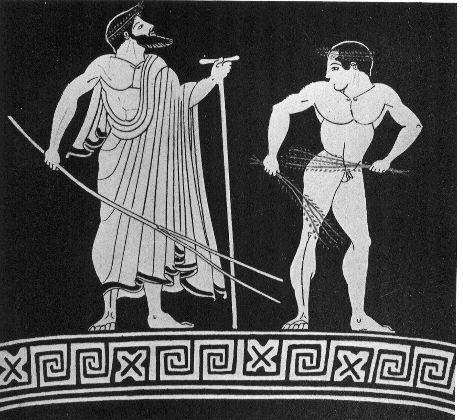
- Theagenes of Thasos - He was a boxer, Pankratiast, and runner. He won boxing the 75th Olympics in 480 BCE. He also won pan ration in 76th Olympics in 476 BCE.
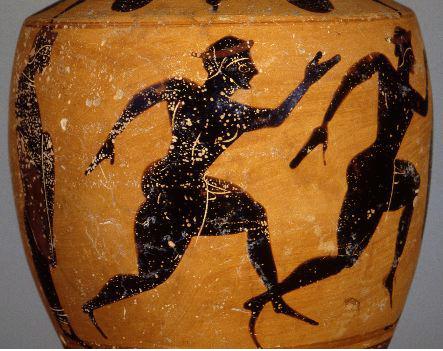
- Diagoras of Rhodes - He was a boxer and won in the 79th Olympic Games in 464 BCE.
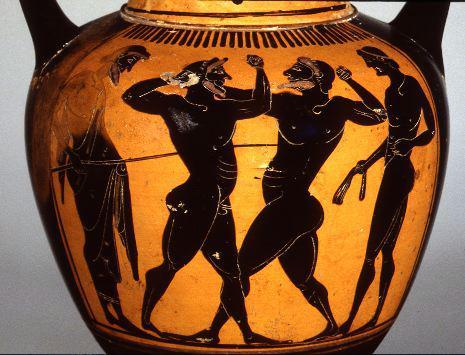
- Polydamas of Skotoussa - He was a Pankratiast and he won in the 93rd Olympic Games in 408 BCE.
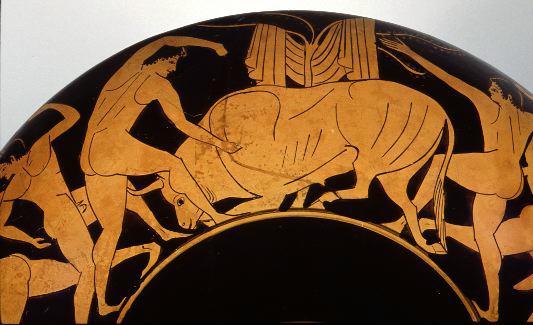
- Melankomas of Caria - He was a boxer who won in the 207th Olympic Games in 49 AD.
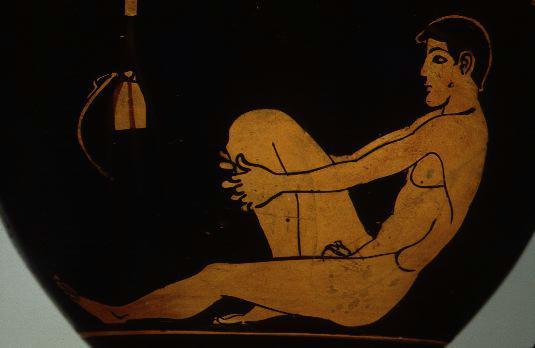
Below Is FAQ about the ancient Olympic Games
Where did the Olympic games come from?
There are different stories on where they come from. There is one myth that says the guardians of the god Zeus held the first footrace. Or even Zeus himself started to celebrate his victory over his father Cronus for control of the world. Another story says that the Greek hero Pelops won a chariot race against King Oenomaus to marry the King?s daughter, and then established the Games.
Why were they help at Olympia?
In the ancient Greek world, Olympia was one of the oldest religious centers. Because athletics contests were a way to honor the ancient Greeks? gods, it was best to hold a athletic competition at the place of a major temple. Another reason, is that Olympia was easy to reach by ship and that was a major concern for the Greeks. Both athletes and spectators traveled from as far away as Spain, the Black Sea, and Egypt.
Were there other contests like the Olympics?
Yes, three other major games which were held 2 or 4 years apart. They were the Isthmean Games at Corinth, the Pythian Games at Delphi, and the Nemean Games at Nemea. But the Olympics remained the most famous athletic contest in the ancient Greek world, because it started 200 years before the others.
Who could compete in the Olympics?
They were open to any free-born Greek in the world. Women were not allowed to compete in the Games themselves. But they could enter equestrian events as a owner of a chariot team or an individual horse and win that way. Now there were separate men?s and boy?s divisions for the events.
Were women allowed at the Olympics?
Not women were not permitted to compete personally. Married women were banned from even attending the Games, if they did the penalty was death. Maidens were allowed to attend though.
There was not many athletic competitions for women in ancient Greece. But the most famous was a maidens? footrace to honor the goddess Hera. There was 3 separate races for girls, teenagers and young women. The length for the race course was shorter than the men. The winners received olive crowns just like the Olympic winners.
How were the athletes trained?
In ancient Greece, the athletics were a key part of education. Many believed that developing the body was equally important as improving the mind for overall health. The regular exercise was important for men because they were always needed for military service. Plato's Laws specifically mentions how athletics improved military skills. Greek youth worked out in a wrestling-school, palaestra; whether they were going to be Olympic contenders or not.
What prizes did Olympic victors get?
- A crown made from olive leaves
- Treated much like modern sports celebrity by his home city
- Increased fame and reputation of his community in the Greek world
- Have all their meals at a public expense
- Front-row seats at the theater and other public festivals
- A private gym for the Olympic wrestling champion to exercise in
But if an Olympic winner from Crotona re-entered the Games as a native of Syracuse and won both times, the citizens of Crotona would be so angry that they were being robbed of their rightful victories that they tore down the athlete?s statue in their city and condemned his house to be a prison.
Who were the Olympic judges?
The judges didn?t come from all over the Greek world, by were from Elis. The number of judges increased to 10 as more events were added to the Olympic Games.
What was the penalty for cheating?
Anyone who was caught cheating was fined by the judges, the money was used to make statues of Zeus.
Some violations include:
- Bribes
- Avoiding training period at Olympia.
There has been a few athletes that have given excuses. One said that bad winds kept his ship from arriving on time, but later proved to have spent the training period traveling around Greece winning prize money in other competitions. Another athlete was intimidate by his opponents that he left the Games the day before he was to compete and was fined for cowardice.
Where did the marathon come from?
The marathon was never an event in the ancient Olympic. The traditional origin comes from a story about how a herald named Phidippides ran the 26 miles from Marathon to Athens to announce the Greek victory and died on the spot. He was sent by the Athenians to Sparta to ask for help and a man named Eukles announced the victory to the Athenians and then died. Sources confused the story of Phidippides with that of Eukles. The modern Olympic marathon is approximately 26 miles and usually takes over 2 hours for athletes to finish.
When did the ancient games begin and when did they end?
Placing a certain date on the start of the contest is impossible because legends have been it difficult to come up with a origin of the games. The first recorded Olympic Game winner was Koroibos of Elis on 776 BC in Historical records and documents have been persevered a long list of subsequent Olympic winners. The games carried on every four years, even as Greek?s power declined and Rome?s rose. In 393 or 294 AD, Theodosius I legally abolished the games, since the Olympic games were first and foremost a religious celebration in honor of Zeus, they held no place in the Christian empire.